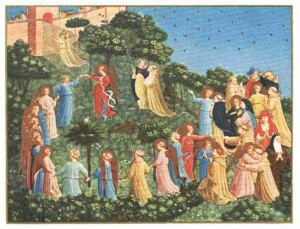My uncle died a couple of years ago. At the time of his death, I had cause to go back to a particularly beautiful chant piece for funeral Masses called the “In Paradisum” (IP).
The Latin text (with my own rough English translation beneath) is as follows:
In Paradisum deducant te Angeli;
(May the Angels lead you into Paradise;)
in tuo adventu suscipiant te Martyres,
(in your coming, may the martyrs receive you,)
et perducant te in civitatem sanctam Jerusalem
(and guide you into the holy city Jerusalem)
Chorus Angelorum te suscipiat,
(May the Choirs of Angels receive you,)
et cum Lazaro quondam paupere,
(and with the once poor Lazarus,)
aeternam habeas requiem
(may you have eternal life)
 While translating, I was suddenly caught up into the beauty of this piece. At the same time, I was also listening to a rendition of IP performed by the Gloriae Dei Cantores Schola in Massachusetts (see also here). Please take a moment to stop and listen before continuing.I started to think about how beautiful it is at death when a soul in the state of grace and who loved and served God throughout his/her life goes to God. When such a person dies, they are greeted by the saints and angels who come to receive that soul and guide it into heaven (here represented by Jerusalem). There, the soul sees the glory of heaven with the Choirs of Angels singing praise to God.
While translating, I was suddenly caught up into the beauty of this piece. At the same time, I was also listening to a rendition of IP performed by the Gloriae Dei Cantores Schola in Massachusetts (see also here). Please take a moment to stop and listen before continuing.I started to think about how beautiful it is at death when a soul in the state of grace and who loved and served God throughout his/her life goes to God. When such a person dies, they are greeted by the saints and angels who come to receive that soul and guide it into heaven (here represented by Jerusalem). There, the soul sees the glory of heaven with the Choirs of Angels singing praise to God.
It is a powerful welcoming committee.
The purpose of this leading and receiving is to take us to the Eternal Father. When we go to the Father, we go to the “Rex tremendae maiestatis” (King of tremendous majesty) and the Just Judge. Father and King: these ought to inspire piety and fear of the Lord.
Further beautiful imagery comes at the very end with the mentioning of the once poor man Lazarus from Luke 16: 19-31. Lazarus was “once poor” because he lived in poverty on earth but in death was taken up to the bosom of Abraham where he was comforted. He is poor no longer. He enjoys eternal life and is not burned by the flames as was the rich man who ignored Lazarus’ need(s).
Let us all take a moment to reflect upon our lives and its direction and ask if we are ready to meet the Father if we were called home today.



